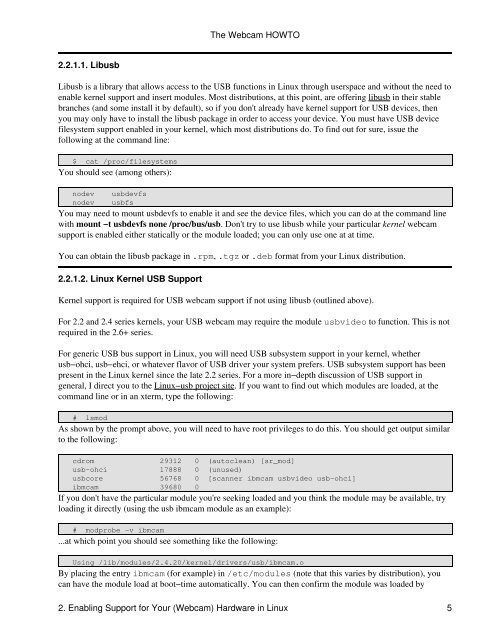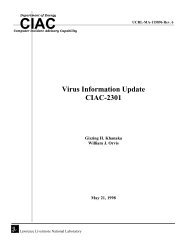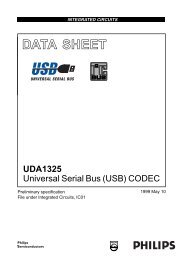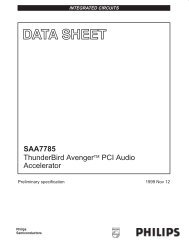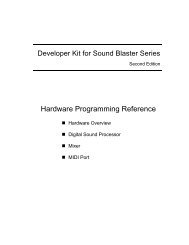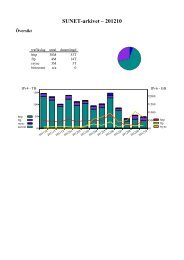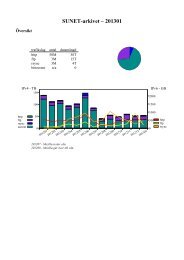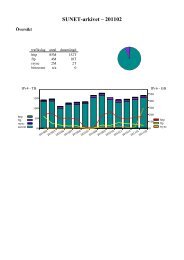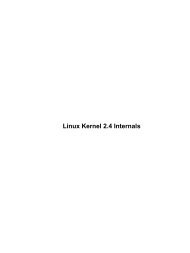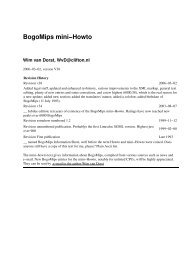The Webcam HOWTO - The Linux Documentation Project
The Webcam HOWTO - The Linux Documentation Project
The Webcam HOWTO - The Linux Documentation Project
Create successful ePaper yourself
Turn your PDF publications into a flip-book with our unique Google optimized e-Paper software.
2.2.1.1. Libusb<br />
Libusb is a library that allows access to the USB functions in <strong>Linux</strong> through userspace and without the need to<br />
enable kernel support and insert modules. Most distributions, at this point, are offering libusb in their stable<br />
branches (and some install it by default), so if you don't already have kernel support for USB devices, then<br />
you may only have to install the libusb package in order to access your device. You must have USB device<br />
filesystem support enabled in your kernel, which most distributions do. To find out for sure, issue the<br />
following at the command line:<br />
$ cat /proc/filesystems<br />
You should see (among others):<br />
nodev usbdevfs<br />
nodev usbfs<br />
You may need to mount usbdevfs to enable it and see the device files, which you can do at the command line<br />
with mount −t usbdevfs none /proc/bus/usb. Don't try to use libusb while your particular kernel webcam<br />
support is enabled either statically or the module loaded; you can only use one at at time.<br />
You can obtain the libusb package in .rpm, .tgz or .deb format from your <strong>Linux</strong> distribution.<br />
2.2.1.2. <strong>Linux</strong> Kernel USB Support<br />
<strong>The</strong> <strong>Webcam</strong> <strong>HOWTO</strong><br />
Kernel support is required for USB webcam support if not using libusb (outlined above).<br />
For 2.2 and 2.4 series kernels, your USB webcam may require the module usbvideo to function. This is not<br />
required in the 2.6+ series.<br />
For generic USB bus support in <strong>Linux</strong>, you will need USB subsystem support in your kernel, whether<br />
usb−ohci, usb−ehci, or whatever flavor of USB driver your system prefers. USB subsystem support has been<br />
present in the <strong>Linux</strong> kernel since the late 2.2 series. For a more in−depth discussion of USB support in<br />
general, I direct you to the <strong>Linux</strong>−usb project site. If you want to find out which modules are loaded, at the<br />
command line or in an xterm, type the following:<br />
# lsmod<br />
As shown by the prompt above, you will need to have root privileges to do this. You should get output similar<br />
to the following:<br />
cdrom 29312 0 (autoclean) [sr_mod]<br />
usb−ohci 17888 0 (unused)<br />
usbcore 56768 0 [scanner ibmcam usbvideo usb−ohci]<br />
ibmcam 39680 0<br />
If you don't have the particular module you're seeking loaded and you think the module may be available, try<br />
loading it directly (using the usb ibmcam module as an example):<br />
# modprobe −v ibmcam<br />
...at which point you should see something like the following:<br />
Using /lib/modules/2.4.20/kernel/drivers/usb/ibmcam.o<br />
By placing the entry ibmcam (for example) in /etc/modules (note that this varies by distribution), you<br />
can have the module load at boot−time automatically. You can then confirm the module was loaded by<br />
2. Enabling Support for Your (<strong>Webcam</strong>) Hardware in <strong>Linux</strong> 5


